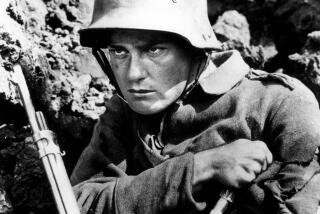‘Alexander Nevsky’ Rides Again : Restored video and laser releases and a new recording of the Prokofiev soundtrack explain for a dubious <i> cineaste </i> the acclaim accorded Eisenstein’s 1938 film epic.
- Share via
Was I the only young film buff who thought that Sergei Eisenstein’s 1938 epic “Alexander Nevsky,” with background score by the redoubtable Sergei Prokofiev, was a crock?
Maybe it was a “cinematic landmark” and the “ultimate union of film and music,” according to two of my handy reference sources. But who could tell from the grainy prints, with the tinny and dim soundtrack, I saw in the cramped college film lab or the crummy art houses my friends and I frequented?
And, in the non-technical realm, there was the dialogue, of comic-strip simplicity, which betrayed the film’s origins as a propaganda document rushed into production to warn Nazi Germany to keep its mitts off Mother Russia. The message was relayed via a recounting of the victory in the 13th Century of Russian forces led by Prince Alexander over the invading Knights of the Teutonic Order.
Ironically, Germany and the Soviet Union signed a non-aggression treaty shortly after the release of “Alexander Nevsky,” and the film was quickly withdrawn from circulation. But only months after that, when Germany attacked Poland, it was back on screens--and on its way to becoming a classic of agitprop and film art.
Of course, many of us know the music well, not via the barely audible (and never published) soundtrack but through the concert cantata Prokofiev fashioned from it in 1939.
Now the film has been re-released in VHS format and on laser disc, with a cleaned-up print and a newly performed and recorded soundtrack employing state-of-the-art sonics. Seeing and listening to it now make all the adulatory noise about the Eisenstein-Prokofiev “Alexander Nevsky” comprehensible.
The black-and-white photography is by Edward Tisse, whose camera creates haunting vistas of great rivers and plains, of onion-domed cathedrals (whose cupolas blaze with golden splendor, even without benefit of color) and phalanxes of menacingly armored cavalry. Tisse also revels in stunning close-ups of the leading actors, including the saintly, heroic and handsome Nikolai Cherkasov as the indefatigable Alexander and, among his German nemeses, the cruel, cowardly and handsome Vladimir Yershov as the grand master of the Teutonic Knights and his grotesque sidekick, the organ-playing black-robed monk played by Naum Rogozhin (surely the inspiration for Marty Feldman’s immortal Igor in “Young Frankenstein”).
Interestingly, while much of the film is taken up with scenes of slaughter--which find Prokofiev at his most inspired--not a drop of blood, German or Russian, is shown, nor is there even a limb askew, much less severed, amid all the swinging broadswords, battle-axes, maces and cudgels.
Both formats of this impres sive audiovisual package, devised by a team headed by executive producer John Goberman, are available from BMG, and the score alone is on an RCA Victor compact disc (61936), performed by various St. Petersburg choruses and the St. Petersburg Philharmonic, conducted by Yuri Temirkanov.
Although the best of the music is contained in the cantata, there is worthwhile additional material in the original, including the sneaky-nasty stuff for the German prisoners in the final scenes and the walloping timpani riffs in the climactic icy battle scene.
Temirkanov, who knows his Prokofiev as well as any other living conductor, is, of course, directing the score in sync with the film, which means tempos slower than would be encountered in a concert hall presentation of the cantata.
Although the notes are Prokofiev’s own, the expert musical arranger of the project, William D. Brohn, has re-employed and rearranged several numbers to fill in gaps, such as for the opening titles, giving us even more of a good thing.
One cavil: the quavery, characterless singing of mezzo soloist Evgenia Gorohovskaya in “The Field of the Dead.” Her contribution seems particularly weak beside the sumptuous (in tone and expression) performance by Ewa Podles in a handsome new recording of the cantata version, in which Jean-Claude Casadesus conducts the Lille National Orchestra and Latvian State Chorus (Harmonia Mundi 901523).*
More to Read
Only good movies
Get the Indie Focus newsletter, Mark Olsen's weekly guide to the world of cinema.
You may occasionally receive promotional content from the Los Angeles Times.










